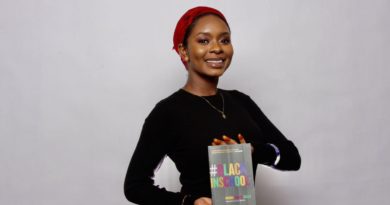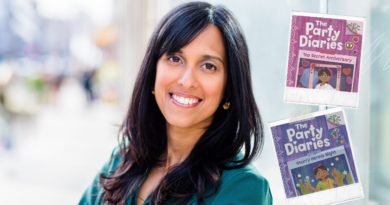Can you be Christian and queer? Sharon Lewis’ documentary WITH WONDER answers — and inspires

“Write a love letter to God about why you aren’t down with conversion therapy.”
So opens the description of With Wonder on multi-award-winning Canadian filmmaker and activist Sharon Lewis’ website. The documentary film, which she directed and co-produced with Byron Kent Wong, centres on the question “can you be Christian and queer?”.
In the film, international BIPOC participants Maurice, DLo, Lady Phyll, Jessicka, Tanya, Reverend Jide, and Reverend Winnie lay bare their experiences reconciling their sexual orientation with their faith. Lewis compellingly captures their disparate lives in Los Angeles, London, Montego Bay and Lagos – lives which are united by a tortured and fraught relationship with religion. With Wonder is an official selection at the Toronto Black Film Festival, February 16 – 21 and the Halifax Black Film Festival, February 24 – 28, 2022.
A Saturday afternoon Zoom chat with Lewis makes it clear how she elicited such stunning candour from the film’s stars. She is disarmingly warm, forthcoming and empathetic – beginning with her admission that after winning awards for her CBC documentary Disruptor/Conductor, she never intended to make another documentary. She had wanted to move into directing scripted work . . . but during the filming of Disruptor/Conductor, which profiles Daniel Bartholomew-Poyser, the first openly gay black, classical musical conductor, something started to “percolate” in Lewis’ mind. Bartholomew-Poyser’s experiences of Christianity and queerness as contradictory collided with her own muted struggle with neat Queer/Christian boxes. She ended up “falling into this doc because I really wanted to answer that question, ‘can you be Christian and queer?’”
Of course, “conversion therapy basically says ‘No. You cannot be Christian. You have to be straight.” But that didn’t ring true for Lewis. “Having come from the Caribbean and from a very mixed family, Black and White, Jewish, religion did not play a huge part in forming me. Although I was raised Christian, part of my family was Hindu, and part of my family’s Christian.” So she didn’t feel, “Oh, I can’t come out because the Bible says so.” Her struggles were instead rooted in societal attitudes. And this led to her choice to make With Wonder a subjective documentary. Lewis purposely excluded experts and commentators who might share analysis, statistics, or geopolitical and socio-political views. “It was people who were going to tell their own story about their struggle and journey to find some peace between being queer and Christian.”
Lewis found With Wonder’s “people” through mutual connections. One participant would recommend another, who would recommended still another. A year into filming, they numbered 15. And it was increasingly clear to Lewis and the creative team that BIPOC people have a specific story and a specific relationship to Christianity. “Because most of us come from countries and experiences that were colonized, we already have a view of the church as being other and having been forced upon us,” she recalls. “So now you’ve got this colonized religion on top of your queerness that says you don’t belong in that religion . . . but it also says you don’t belong in your community.” This would become the focus of the film: “Where do you find that strength? Because most people who are spiritual and connected to a religion find their strength through that religion” – not the opposite. For this reason, “I really wanted to focus on that [BIPOC] experience.”

For example, one of the women in the documentary was in rural Jamaica, where she faced tremendous pressure from her village, her parents and her church to give up her queerness. Her experience is a marked distinction from those in the LGBTQ1+ community who are not connected to a religion: “they don’t look to religion to help them through those hard times.” On the other hand, “When you’re looking to the very source of love, and that source of love is saying you’re actually evil or there’s something wrong with you, it’s truly devastating and truly traumatizing in a way that is different than when your parents or your caregivers say it. Because you add, on top of that, the whole institution of the church and the interpretation of God saying, ‘Not only do we disagree with it, but this whole institution and creator of this entire universe thinks there’s something wrong with you.”
Critic and audience responses to With Wonder have been overwhelmingly positive. Despite the weighty subject matter, the documentary is leaving most viewers with feelings of hope, joy, love and connection. This pleases Lewis: “I want so much for it not to be a trauma documentary… trauma porn. This isn’t. I really pull back on some of the stories so that it isn’t. People of colour and queer people are often asked to just talk about their trauma. We sort of display our trauma – which is why I have stand-up comedians in there: for you to go on the journey with them and see that they’re survivors. They are in love and have kids and are thriving and have trauma. You don’t see them in a one-dimensional way…. I hope that you cry and laugh.”
Despite the documentary’s positive reception – including the Audience Choice Award at the Reelworld Film Festival last fall – some have criticised Lewis for “not coming down harder on the church and not calling the church out for its homophobia” in the film. “They’re really angry that I didn’t take a position on the church: that it’s colonialist, homophobic, patriarchal, and continues to contribute to suicides in the BIPOC queer community.” This choice was not political correctness: in Lewis’ view, these critics have missed the point of the film: “What I’m saying is we have no right to take away somebody’s God. If that is what gives them strength and hope and love, we have no right to take that away. It causes death. It literally causes people to kill themselves. If I say, ‘you have to walk away from the church in order to feel better about yourself,’ I myself am taking away that source of comfort. So how can I do that – and why?”

That said, she is quick to add that no one should assume that any of the participants is ignorant of what the church has perpetrated, or seeks to excuse the patriarchal and colonialist history of the Christian churches. For those growing up in a smaller communities, church is not just for Sundays. The local church is the main place to get community support. It is a mainstay and focal point for every aspect of life. “What I really wanted to do with this doc was to show through these participants that they each have found their own journey to come to peace with God and with the church – and sometimes those two, oftentimes those two – have been separated for them.”
So in the end, did participating in the documentary help the participants to answer Lewis’ central question of whether Christianity and queerness can co-exist? “I think they had the answer already,” Lewis smiles. “I think what the documentary did was help them articulate the why. For example, Maurice, who’s from Jamaica, is leading the Pride March in Jamaica. And he grew up in the church. He really, really grew up in the church. And he hasn’t found his way back to the church in a peaceful way. But then there’s a Reverend who’s South Asian and queer. She’s a Reverend in the Anglican Church. She’s fully embraced the church, and has found joy and comfort and empowerment in being in the church – and being able to feel the love of God and spread the love of God as a queer, South Asian Minister Retreat priest.”
After filming and editing the footage for a year, Lewis found the experience of watching the finished documentary with all of the participants to be poignant and affecting. ”I had lived with them for a year, but to watch them watch themselves retelling a very painful time in their lives… It was really hard, to be honest. It was hard to watch how painful it was.”
But then “in the end, it was really beautiful. Because many of the participants shared their tears and their joy that their stories were being told. And maybe those stories could be of help to other people. .. people who really judge them for being part of the church, or really judge them for being queer, or judge them for both.”

Ultimately, Lewis’ most fervent hope is that viewers engage without judgment: that “you see the humanity when listening to these stories, that you really see them as people.”
With Wonder will grab audiences’ hearts and hold tight. And February offers two great opportunities to experience it: the Toronto Black Film Festival February 16 – 21 and the Halifax Black Film Festival February 24 – 28.
© Arpita Ghosal, SesayArts Magazine, 2022
About The Author
Arpita Ghosal
Arpita Ghosal is a Toronto-based arts writer. She founded Sesaya in 2004 and SesayArts Magazine in 2012.
Visit About Us > Meet the Team to read Arpita’s full bio …




